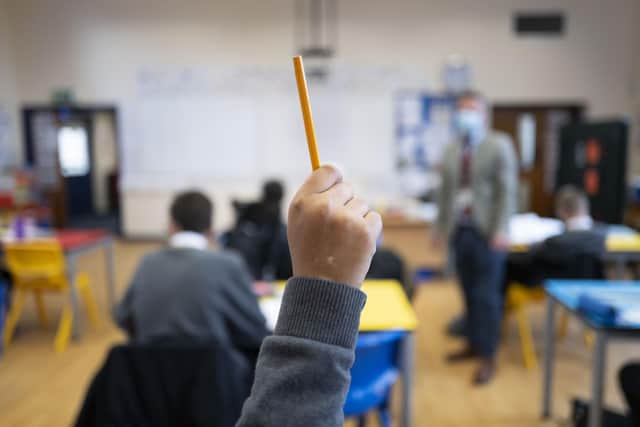Poverty-related attainment gap in schools won't be closed by Education Scotland officials spouting ridiculous 'educrap' – Cameron Wyllie
All the way through these five idyllic days, I knew that on the train home I was going to read the recent report of the Scottish Parliament’s Education Committee.
I was reminded of this on every London Underground platform, when rather posh voice intoned “Mind The Gap”, where the word “mind” means ‘be careful of’ and “the gap” is the space between the train and the platform, but I of course took it to be an instruction not to forget the poverty-related educational attainment gap in Scotland, the removal of which has been, since 2015, a stated priority of the Scottish Government, a priority which they have signally failed to achieve. This report will not help.
Advertisement
Hide AdAdvertisement
Hide AdIt is 68 pages long but I had plenty of time to digest it, along with the not very nice LNER ‘Tuna Crunch’ sandwich. My reaction must have startled my fellow passengers, consisting as it did initially of some derisive laughter, then cursing, then a lapse into incoherent despair as we rolled along towards an overcast Edinburgh.
It’s a depressing read, with some astonishing moments of hubris from some individuals and institutions whose views were sought, with others – headteachers, unions, third sector organisations – desperately trying to explain just how difficult conditions are for teachers and schools in 2022.
Remember, this is a committee of ten people, five of whom are from the SNP; its concerns are, in truth, probably more moderately expressed than they might be.
Still, they do say this: “The committee notes that the Attainment Challenge has been in place since 2015 and during that time many new interventions have been adopted, adapted and, in some cases, abandoned."


Remember that each of these ‘interventions’ is another straw on the headteacher’s back and that each uses up valuable cash. What heads need is less governmental ‘intervention’ and more autonomy and time to think for themselves, their staff, their school and the kids they teach.
Right at the start of the report, it speaks of the challenges schools face with recruitment and retention of heads, quoting a survey of depute headteachers of primary schools where only 18 per cent said they were keen to become headteachers. That is a jaw-dropping figure and its implications are terrifying.
The report rightly calls for protected time for teachers, parents and pupils to determine the spending of pupil equity funding (PEF) in consultation with headteachers. I will believe that when I see it. Currently, headteachers don’t have protected time to discuss anything, including their own stress and that on colleagues, which is responsible for so much staff absence.
How about this: don’t go ahead with the planned ‘reforms’ of Education Scotland, just shut it down and use some of the £38 million saved to fund retreats for senior staff to consult with each other about PEF and the attainment gap directly. Former Education Scotland staff – those who are appropriately qualified and fit enough – could be employed, at appropriately reduced salaries, to provide cover.
Advertisement
Hide AdAdvertisement
Hide AdThe report quotes Professor Mel Ainscow of the University of Glasgow as quite rightly saying headteachers want more autonomy over funding decisions – “we need to give teaching back to teachers” – but for all the talk about “consultation” there is precious little evidence of this happening.
In essence, there are two huge problems with the report. Firstly, it is content to lay much blame for the failure to make any advances in educational improvement on the pandemic.
Well, certainly the Scottish Government’s response to the pandemic has been a setback, because the schools remained closed for far too long, and online education and ‘home schooling’ quite obviously advantaged middle-class, particularly privately educated, children.
This was an absolutely transparently obvious outcome from the outset of lockdown. The lives of our young people have been adversely affected in so many ways by keeping the schools closed, but none more so than the most disadvantaged among them.
The second is that the report is largely written in a language best characterised as ‘educrap’: "The committee notes the plan for stretch aims to be set at local authority level and for this to be aggregated into national targets.” What does that even mean?
But my favourite comes from an “Education Scotland Attainment Advisor”, describing the move away from “Challenge Authorities” towards the new “Strategic Equity Fund”, which will (apparently) lead to “a motorway of sustainability and intervention that brings us to a place where we have a solid and embedded approach.” Presumably the previous years have been a 32-car pile up in deep fog. We are paying for this, people!
Is it just too simple to say that the root causes of poverty need to be dealt with at source while heads and teachers and schools, unencumbered by initiatives and interventions, strive to provide the best possible education for all their pupils? I believe that is the way to close the poverty-related attainment gap.
Essentially, the gap which should worry Shirley-Anne Somerville isn’t actually poverty-related, it’s the gap between the fantasies in the heads of Education Scotland officials and the reality of Scottish education as it faces the long winter ahead.
Advertisement
Hide AdAdvertisement
Hide AdThere needs to be radical change in the way Scottish Education is run; meanwhile the Education Committee seems happy enough about overseeing yet more messing about.
Cameron Wyllie’s book ‘Is There A Pigeon in the Room? My Life in Schools’ is published by Birlinn. He writes a blog called A House in Joppa
Comments
Want to join the conversation? Please or to comment on this article.
